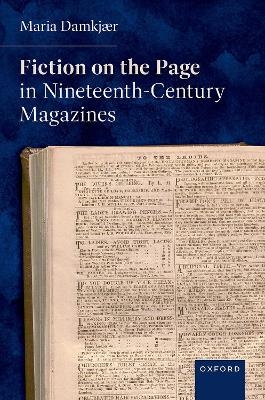
Fiction on the Page in Nineteenth-Century Magazines
Seiten
2024
Oxford University Press (Verlag)
978-0-19-893605-3 (ISBN)
Oxford University Press (Verlag)
978-0-19-893605-3 (ISBN)
This book uncovers the genre mixing of the Victorian era's mass media, and argues that authors like Charles Dickens, Elizabeth Gaskell and George Augustus Sala had to reckon with the commercial needs of print and of narrative fiction.
What makes fiction recognizable as fiction? Texts are shaped by their material print, but this book argues that they can also be made in response to it: that the needs of the magazine in the nineteenth century spurred writers to create hybrid, entangled texts. Using book history, genre theory, and literary close-reading, this book argues that narrative fiction in the nineteenth-century popular periodical was a malleable substance. By looking at typography, and the attempts to squeeze in too much text, or stretch out too little text, the book asks what the relationship was between the page that needed filling and the short story that tried to fill it. In the messy hybrids and outliers, we explore what fiction might have become.
The book works with magazines like the Englishwoman's Domestic Magazine (first series, 1852-59), the Family Herald (1842-1945), the Home Circle (1849-54), and authors like Elizabeth Gaskell, George Augustus Sala, and Samuel Beeton. It also includes a chapter on Charles Dickens's arguably least successful venture, Master Humphrey's Clock (1840-1), where Dickens was noticeably straining to sell and fill a weekly magazine. While the book is not attempting to destabilise the status of canonical fiction, it does ask how the page makes fiction happen; what kind of readers magazines imagined for themselves; and what readers thought they were reading when they picked up an issue. The book argues that magazines projected a print imaginary, a symbolic realm where the magazine fits perfectly into the lives of happy, active readers.
What makes fiction recognizable as fiction? Texts are shaped by their material print, but this book argues that they can also be made in response to it: that the needs of the magazine in the nineteenth century spurred writers to create hybrid, entangled texts. Using book history, genre theory, and literary close-reading, this book argues that narrative fiction in the nineteenth-century popular periodical was a malleable substance. By looking at typography, and the attempts to squeeze in too much text, or stretch out too little text, the book asks what the relationship was between the page that needed filling and the short story that tried to fill it. In the messy hybrids and outliers, we explore what fiction might have become.
The book works with magazines like the Englishwoman's Domestic Magazine (first series, 1852-59), the Family Herald (1842-1945), the Home Circle (1849-54), and authors like Elizabeth Gaskell, George Augustus Sala, and Samuel Beeton. It also includes a chapter on Charles Dickens's arguably least successful venture, Master Humphrey's Clock (1840-1), where Dickens was noticeably straining to sell and fill a weekly magazine. While the book is not attempting to destabilise the status of canonical fiction, it does ask how the page makes fiction happen; what kind of readers magazines imagined for themselves; and what readers thought they were reading when they picked up an issue. The book argues that magazines projected a print imaginary, a symbolic realm where the magazine fits perfectly into the lives of happy, active readers.
Maria Damkjær is an Associate Professor in English at the University of Copenhagen. She received her PhD degree from King's College London in 2013, and published her first book Time, Domesticity and Print Culture in Nineteenth-Century Britain in 2016. She has received numerous grants and awards, including a Carlsberg fellowship and a teaching award. Her work centres on nineteenth-century literature, print culture, material culture, and the periodical press.
| Erscheinungsdatum | 24.12.2024 |
|---|---|
| Verlagsort | Oxford |
| Sprache | englisch |
| Maße | 160 x 240 mm |
| Gewicht | 520 g |
| Themenwelt | Geisteswissenschaften ► Sprach- / Literaturwissenschaft ► Anglistik / Amerikanistik |
| Geisteswissenschaften ► Sprach- / Literaturwissenschaft ► Literaturgeschichte | |
| Geisteswissenschaften ► Sprach- / Literaturwissenschaft ► Literaturwissenschaft | |
| Sozialwissenschaften ► Kommunikation / Medien ► Medienwissenschaft | |
| ISBN-10 | 0-19-893605-2 / 0198936052 |
| ISBN-13 | 978-0-19-893605-3 / 9780198936053 |
| Zustand | Neuware |
| Informationen gemäß Produktsicherheitsverordnung (GPSR) | |
| Haben Sie eine Frage zum Produkt? |
Mehr entdecken
aus dem Bereich
aus dem Bereich
Poetik eines sozialen Urteils
Buch | Hardcover (2023)
De Gruyter (Verlag)
CHF 83,90
Buch | Softcover (2024)
belleville (Verlag)
CHF 27,95


